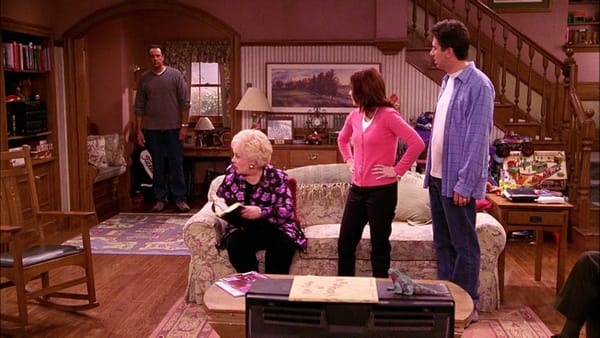Episodes: Beware marketing

A couple of years ago, I got into a big argument with a friend and fellow critic over what I thought was a pretty obvious question: Does Girls mean for us to take Hannah seriously when she says "I might be the voice of my generation" in the pilot?
To me, the answer has always been, clearly, that we're not to take this seriously. Hannah isn't in her right state of mind when she says it, she's being over-dramatic (as she usually is), and she immediately undercuts that line with a punchline: "Or at least a voice of a generation." It's a good, funny punchline, probably the biggest laugh in the pilot for me, and when I saw it, it sold me on what the show was trying to do. It was about a very specific kind of youthful energy, one where you want to create something but don't yet know what that something looks like. If you watch the show throughout its run, this is the closest thing it has to an arc: Hannah gradually figures out how to harness that energy to create something worth paying attention to, even if she's not the voice of her generation.
My friend, however, had the opposite thought: That this was the show setting a goal for itself. Hannah might not be at her best in the pilot, but by the time we got to the end of the finale, viewers would see that she really had been the voice of her generation all along. And since the finale hasn't yet aired, my friend might yet turn out to be right (though I'm sticking with my interpretation for the time being).
When I pressed my friend on this point, my friend said something I found interesting: They were certain this was what Girls was aiming for, because the line -- "I may be the voice of my generation" -- had been stripped out of context and layered in throughout the marketing of the show. Their argument, essentially, was that even if the show could undercut that moment, it couldn't undercut weeks and weeks of the trailer, with that single line, with the implication that HBO wanted you to think that's what this show was about (or at least think that's what Lena Dunham was all about). And once the viewer has internalized that reading of the show, doesn't that essentially make that what the show is about?
I would argue that, as critics, no, we shouldn't be doing this. We should be approaching the work in as much of a vacuum as we can manage. But, of course, that's impossible. We all bring our own baggage, and a lot of the time, that baggage is influenced by advertising campaigns.
To return to Girls, I watched the first three episodes months and months before the show debuted, before HBO had even dreamed up an ad campaign. I watched those first three episodes alone in a TCA suite, listening through headphones, and I loved them. They felt fresh and funny and honest and unlike other stuff on TV. I let my enthusiasm be known to HBO (since I was interviewing Dunham the next day), and I'm sure that my enthusiasm, along with the enthusiasm of so many others, colored the advertising that was done for the show, which created the omnipresent sense of the series being about this Incredible New Talent in Her Formative Years, which played into the hard sell HBO was making for Dunham herself, which all primed the backlash to the hard sell, which primed the backlash to both the show and the critics who praised it. By the time the series debuted, between the reviews and the marketing, it was being sold as the greatest new show ever, and there's no way any show can stand up to that.
So was my initial reaction wrong? No. But I do sometimes wonder if we critics, who see so little marketing, period, have such vastly different experiences from our readers so as to be unhelpful. I think, for instance, of how many times as a teenager I would be mad at a film that didn't match up to a great trailer, or perhaps overrate a film because the trailer was so good (American Beauty comes to mind as one that had me so perfectly and thoroughly hyped that it took me a long time to see through that hype to what I really thought).
When I saw Girls all by myself at TCA in 2012, I know how I felt about it, and I trust how I felt about it. But I also became part of a hype cycle that eventually swallowed the show whole. That's, I think, unavoidable in this business. But I do wonder sometimes if I should try to take in more of the marketing, just to get a fuller picture of what my readers are seeing.
And, alternately, I would flip that around on my readers, too. Sometimes, marketing can hurt a project, in one direction or another. Sometimes, the best thing to do is just tune it out, hard as that might be.
---
New feature! If you haven't noticed, I struggle to come up with good ideas for three newsletters a week, which means the Friday newsletter is usually just a mess. In the interest of having you do work for me, I'd like to turn that Friday newsletter into a mailbag. Please email me your questions over the course of the week, and I'll pick a few I find interesting and go from there. I always wanted a mailbag column at AVC, so this will be a massive ego boost.
--
Episodes is published three-ish times per week, and more if I feel like it. It is mostly about television, except when it's not. Suggest topics for future installments via email or on Twitter. Read more of my work at Vox.




